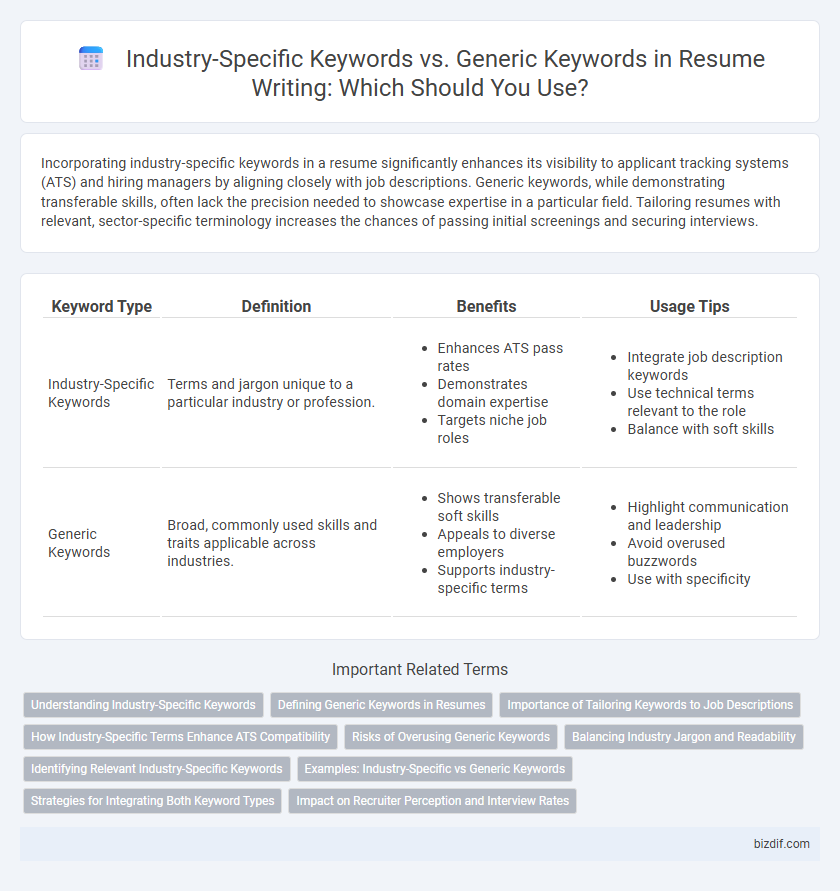Incorporating industry-specific keywords in a resume significantly enhances its visibility to applicant tracking systems (ATS) and hiring managers by aligning closely with job descriptions. Generic keywords, while demonstrating transferable skills, often lack the precision needed to showcase expertise in a particular field. Tailoring resumes with relevant, sector-specific terminology increases the chances of passing initial screenings and securing interviews.
Table of Comparison
| Keyword Type | Definition | Benefits | Usage Tips |
|---|---|---|---|
| Industry-Specific Keywords | Terms and jargon unique to a particular industry or profession. |
|
|
| Generic Keywords | Broad, commonly used skills and traits applicable across industries. |
|
|
Understanding Industry-Specific Keywords
Understanding industry-specific keywords is crucial for tailoring a resume to pass applicant tracking systems (ATS) and catch the attention of hiring managers. Incorporating precise terms related to job roles, tools, certifications, and processes unique to the industry enhances relevancy and demonstrates expertise. Generic keywords lack the impact of specialized vocabulary that aligns directly with job descriptions and industry standards.
Defining Generic Keywords in Resumes
Generic keywords in resumes refer to widely used terms that describe common skills, attributes, and experiences applicable across various industries, such as "teamwork," "communication," and "problem-solving." These keywords enhance a resume's visibility during initial applicant tracking system (ATS) scans by matching basic job requirements but lack the precision to highlight specialized expertise. Incorporating a balanced mix of generic keywords ensures a resume is both broadly recognized and adaptable across multiple roles.
Importance of Tailoring Keywords to Job Descriptions
Tailoring industry-specific keywords in resumes enhances relevance and increases the chances of passing Applicant Tracking Systems (ATS), which scan for precise terms related to the job. Generic keywords may fail to reflect the specialized skills and qualifications sought by employers within a particular sector, reducing resume visibility. Customizing keywords to match job descriptions signals a clear understanding of the role and aligns experience with employer expectations.
How Industry-Specific Terms Enhance ATS Compatibility
Incorporating industry-specific keywords significantly enhances ATS compatibility by aligning resumes with the precise terminology used by employers in the field. These specialized terms improve the likelihood of passing automated screening processes, as they directly match the job descriptions and skill requirements programmed into ATS algorithms. Generic keywords lack the specificity needed to demonstrate expertise, making industry-specific language essential for securing interview opportunities.
Risks of Overusing Generic Keywords
Overusing generic keywords in resumes can result in reduced visibility during Applicant Tracking System (ATS) scans, as these terms often lack the specificity that highlights unique skills or industry expertise. This practice increases the risk of your application being overlooked by recruiters seeking candidates with targeted qualifications and specialized knowledge. Incorporating industry-specific keywords enhances the resume's relevance, boosts ATS rankings, and effectively communicates professional competence within the desired field.
Balancing Industry Jargon and Readability
In resume writing, incorporating industry-specific keywords enhances applicant tracking system (ATS) compatibility and signals expertise to hiring managers. Balancing these technical terms with clear, generic keywords ensures the resume remains readable and accessible to recruiters unfamiliar with specialized jargon. Strategically blending both types optimizes keyword density while maintaining clarity and engagement.
Identifying Relevant Industry-Specific Keywords
Identifying relevant industry-specific keywords involves analyzing job descriptions and company literature to pinpoint technical terms and jargon unique to the field. These keywords enhance resume visibility in applicant tracking systems by matching the language recruiters use. Incorporating precise industry terms rather than generic keywords increases the likelihood of passing automated screenings and capturing employer attention.
Examples: Industry-Specific vs Generic Keywords
Industry-specific keywords such as "JavaScript frameworks," "financial modeling," or "supply chain optimization" demonstrate specialized expertise tailored to a particular field, increasing resume visibility to recruiters using Applicant Tracking Systems (ATS). In contrast, generic keywords like "team player," "hardworking," or "problem solver" can apply broadly but may lack impact in highlighting unique qualifications. Balancing industry-specific terms with select generic skills enhances both keyword relevance and overall resume effectiveness.
Strategies for Integrating Both Keyword Types
Incorporating industry-specific keywords such as "financial modeling," "agile project management," or "cloud architecture" alongside generic keywords like "team leadership," "problem-solving," and "communication skills" enhances resume relevance to applicant tracking systems (ATS) and recruiters. Strategies include analyzing job descriptions to identify priority terms, customizing keywords for each application, and balancing technical jargon with universally valued skills to optimize searchability. This dual approach ensures resumes resonate with both automated filters and human evaluators, increasing interview opportunities across specialized and broad roles.
Impact on Recruiter Perception and Interview Rates
Industry-specific keywords demonstrate specialized expertise and signal a candidate's alignment with the employer's needs, increasing recruiter confidence in relevant skills. Generic keywords may pass automated resume screening tools but often fail to convey the depth of experience critical for competitive roles. Incorporating targeted, industry-specific terminology enhances resume visibility and significantly boosts interview rates by resonating with both Applicant Tracking Systems (ATS) and hiring managers.
Industry-specific keywords vs Generic keywords Infographic

 bizdif.com
bizdif.com